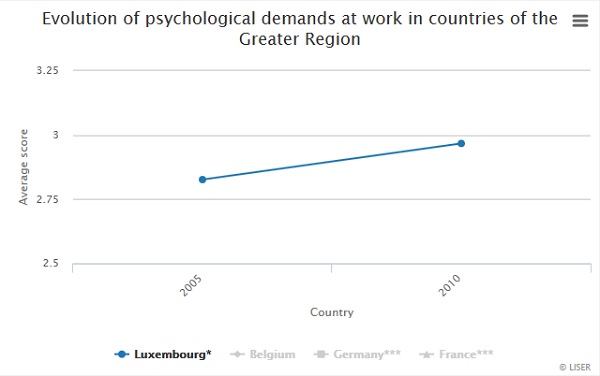
The Luxembourg Institute of Socio-Economic Research (LISER) has unveiled a new socio-economic indicator that shows the evolution of psychological demands in the work environment in Luxembourg, France, Belgium and Germany.
The figures result from an analysis of the European Working Conditions Surveys (EWCS) of 2005 and 2010 (2015 forthcoming).
The idea that employment is a factor of social cohesion is widespread. However, all forms of employment do not contribute effectively to enhancing social cohesion. For the employment to play this role, the job must be of ‘quality’. The assessment of a job’s quality can be determined especially by job insecurity, working hours, psychological demands, decision-making flexibility, or social support.
What psychological demands mean
Psychological demands at work are the psychological pressures experienced by employees as part of their job. Measuring the level of psychological demands for an employee takes into account the pace and the amount of his/her work as well as the level of emotional involvement at work.
A slight increase for Luxembourg
Similar to France, the level of psychological demand in Luxembourg has slightly increased between 2005 and 2010, from 2.82 to 2.97. This trend contrasts with that of other countries in the Greater Region where the level of psychological demand had a tendency to stabilise (Belgium) or even to decrease (Germany).
The idea that employment is a factor of social cohesion is widespread. However, to play this role, the job must be of quality in addition to the individual having a positive relation to it. Since the global financial crisis of 2007 and the economic crisis that followed, employment has known fundamental changes, which lead to changes in the conditions and the quality of work. In this instance, we are interested in the evolution of one of the dimension of the quality of employment *: the psychological demands of the job. Studies on psychosocial risks in the work environment have shown the detrimental effects on the individuals’ health when these risks increase. (Hélardot & Druhle, 2007**; Karasek & Theorell, 1990***).
In Luxembourg, between 2005 and 2010, residents have seen their level of psychological demands in the work environment slightly increased, as has France. On a scale from 1 (very low) to 5 (very high), the level increased in Luxembourg from 2.82 to 2.97 and in France from 2.77 to 3.02. This trend contrasts with the one of Germany, where the level of psychological demand decreased (from 3.23 to 3.05) and with the constant level in Belgium. These differences in trends lead to a convergence of the levels of psychological demands in the work environment in the Greater Region between 2005 and 2010.
Through their work, LISER researchers have identified different socioeconomic phenomena, which are relevant to the Grand Duchy, such as ageing of the working population and the material deprivation or the real estate prices. While not exhaustive, they are designed to provide an overview of the economic, social, and geographical dimensions of the country with a temporal and/or spatial scope thanks to dynamic and/or interactive graphics..








